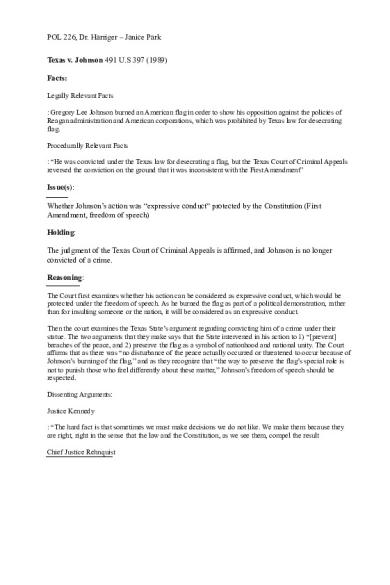Case Brief 21 - Texas v. Johnson PDF

| Title | Case Brief 21 - Texas v. Johnson |
|---|---|
| Author | Gahee Park |
| Course | American Constitutional Law: Civil Liberties |
| Institution | Wake Forest University |
| Pages | 2 |
| File Size | 73 KB |
| File Type | |
| Total Downloads | 50 |
| Total Views | 150 |
Summary
It's a reading notes for the cases that we had to turn in every class...
Description
POL 226, Dr. Harriger – Janice Park Texas v. Johnson 491 U.S 397 (1989) Facts: Legally Relevant Facts : Gregory Lee Johnson burned an American flag in order to show his opposition against the policies of Reagan administration and American corporations, which was prohibited by Texas law for desecrating flag. Procedurally Relevant Facts : “He was convicted under the Texas law for desecrating a flag, but the Texas Court of Criminal Appeals reversed the conviction on the ground that it was inconsistent with the First Amendment”
Issue(s): Whether Johnson’s action was “expressive conduct” protected by the Constitution (First Amendment, freedom of speech) Holding: The judgment of the Texas Court of Criminal Appeals is affirmed, and Johnson is no longer convicted of a crime. Reasoning: The Court first examines whether his action can be considered as expressive conduct, which would be protected under the freedom of speech. As he burned the flag as part of a political demonstration, rather than for insulting someone or the nation, it will be considered as an expressive conduct. Then the court examines the Texas State’s argument regarding convicting him of a crime under their statue. The two arguments that they make says that the State intervened in his action to 1) “[prevent] breaches of the peace, and 2) preserve the flag as a symbol of nationhood and national unity. The Court affirms that as there was “no disturbance of the peace actually occurred or threatened to occur because of Johnson’s burning of the flag,” and as they recognize that “the way to preserve the flag’s special role is not to punish those who feel differently about these matter,” Johnson’s freedom of speech should be respected. Dissenting Arguments: Justice Kennedy : “The hard fact is that sometimes we must make decisions we do not like. We make them because they are right, right in the sense that the law and the Constitution, as we see them, compel the result Chief Justice Rehnquist
POL 226, Dr. Harriger – Janice Park : “Congress passed the Flag Desecration Act of 1968 because flag burning had undermined the moral of America troops in Vietnam.” He also argues that there were many forms of acts such as making verbal denunciation of the flag, burning other symbols, or burning the flag in private that he could do in order to express his dissents. Also, there were many acts that he did that the State did not accused him of, as those acts were protected by the freedom of speech. It is just the flag burning that he was accused of, which is “equivalent of an inarticulate grunt or roar that, it seems fair to say, is most likely to be indulged in not to express any particular idea, but to antagonize others.” Justice Stevens : “The value of the flag as a symbol cannot be measured … [I]n my considered judgment, sancitioning the public desecration of the flag will tarnish in value.”...
Similar Free PDFs

Case Brief 21 - Texas v. Johnson
- 2 Pages

Wesson v. Walmart - case brief
- 2 Pages

Morse v Frederick Case Brief
- 2 Pages

Graham v Connor - Case Brief
- 1 Pages

Barrenblat v US Case Brief
- 2 Pages

Spivey v Battaglia Case Brief
- 2 Pages

Florida v Jardines - Case Brief
- 2 Pages

Lemon v. Kurtzman - Case Brief
- 1 Pages

Obrien v cunard case brief
- 1 Pages

Shelton v Tucker - Case Brief
- 2 Pages

Hess v. Paw Case Brief
- 2 Pages

Nixon v US Case Brief
- 2 Pages

Florida v Harris - Case brief
- 2 Pages

Kingston v. Preston - Case Brief
- 1 Pages

Pennoyer v Neff Case Brief
- 2 Pages
Popular Institutions
- Tinajero National High School - Annex
- Politeknik Caltex Riau
- Yokohama City University
- SGT University
- University of Al-Qadisiyah
- Divine Word College of Vigan
- Techniek College Rotterdam
- Universidade de Santiago
- Universiti Teknologi MARA Cawangan Johor Kampus Pasir Gudang
- Poltekkes Kemenkes Yogyakarta
- Baguio City National High School
- Colegio san marcos
- preparatoria uno
- Centro de Bachillerato Tecnológico Industrial y de Servicios No. 107
- Dalian Maritime University
- Quang Trung Secondary School
- Colegio Tecnológico en Informática
- Corporación Regional de Educación Superior
- Grupo CEDVA
- Dar Al Uloom University
- Centro de Estudios Preuniversitarios de la Universidad Nacional de Ingeniería
- 上智大学
- Aakash International School, Nuna Majara
- San Felipe Neri Catholic School
- Kang Chiao International School - New Taipei City
- Misamis Occidental National High School
- Institución Educativa Escuela Normal Juan Ladrilleros
- Kolehiyo ng Pantukan
- Batanes State College
- Instituto Continental
- Sekolah Menengah Kejuruan Kesehatan Kaltara (Tarakan)
- Colegio de La Inmaculada Concepcion - Cebu
